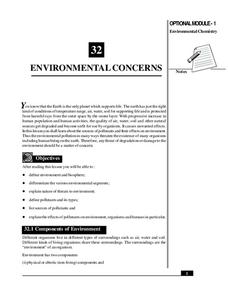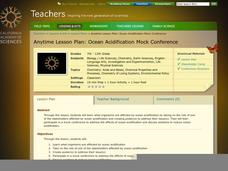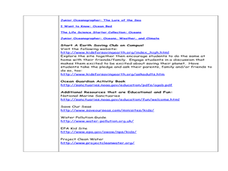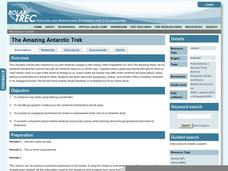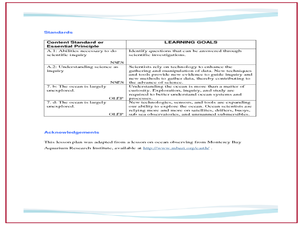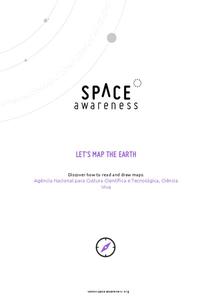National Institute of Open Schooling
Water Pollution
Fifteen million children under the age of five die each year due to diseases in their drinking water. Water pollution is the topic of lesson 34 in the series of 36. Scholars, through reading and discussing, study numerous aspects of...
Chicago Botanic Garden
Carbon, Greenhouse Gases, and Climate
Climate models mathematically represent the interactions of the atmosphere, oceans, land, sun, surface, and ice. Part two in the series of four lessons looks at the role greenhouse gases play in keeping Earth warm and has participants...
National Institute of Open Schooling
Environmental Concerns
Every year, more than 14 billion pounds of garbage is dumped into the oceans of the world, most of which is plastic and toxic to ocean life. Lesson 32 in the series of 36 focuses on environmental concerns, specifically pollution. Under...
Earth Day Network
Conserving Water Through Art!
Having fresh, clean drinking water is a privilege many people take for granted. Help raise awareness about the scarcity of water and the importance of conservation by discussing different ways water is used in everyday life. Brainstorm...
Sargent Art
Protect Our Marine Life
Encourage water conservation and boost art skills with a hands-on activity that challenges young painters to create a scene highlighting marine life. Using oil pastels, scholars draw an underwater scene and write a tip for viewers to...
Chicago Botanic Garden
Causes and Effects of Climate Change
Wrap-up a unit on global climate change with a lesson that examines the causes and effects of climate change. Learners fill out a chart that represents what they think causes climate change—natural and human-based—and what they think...
California Academy of Science
Ocean Acidification Mock Conference
In a comprehensive role playing activity, teens play the parts of different stakeholders in the realm of acidic oceans. They research, debate, and create a presentation from the perspective of either ocean organisms, the fishing...
Curated OER
Lesson Plan on Volcanoes
Fourth graders are able to label a diagram of a volcano with a least 3 of the following parts: the magma chamber, vents, dome, and caldarea. They break up into groups of four and design their own volvanoes using paper and drawing...
Curated OER
Lesson 1 Activity 1: Tools of the Ancients
Students examine how Christopher Columbus determined his latitude.
Curated OER
Tides
Learners discover how the position of the Sun, Moon and Earth affect tides. In this science lesson, students view a presentation about the tides. Learners discuss the different types of tides.
Curated OER
I Can Preserve My Planet
Students explore renewable and nonrenewable resources. In this ocean preservation lesson, students use KWL charts to understand ways the ocean is important to our daily lives. Students create a poster or wirte a letter to someone...
NOAA
I Can't Breathe!
The Gulf of Mexico dead zone, an area of low oxygen that kills marine life, costs the United States $82 million every year. Young scientists research anoxic ocean environments then come up with a hypothesis for the cause of the Gulf of...
Curated OER
Come on In- the Water's Fine
Students examine how coastal erosion effects seaside communities. They investigate how people have to make choices when manipulate the physical environment such as when dredging and constructing seawalls in coastal areas. They complete a...
Polar Trec
The Amazing Antarctic Trek
This resource provides two ways to engage learners in using latitude, longitude, and research skills. In pairs, or on their own, learners will locate several Antarctic regions on a map. They will write the name of the place and a few key...
Curated OER
Renewable vs. Non-Renewable Resources
Fifth graders are introduced to the important topic of renewable, and non-renewable, resources. They are expected to be able to correctly categorize different types of resources as renewable or non-renewable. Another emphasis of this...
California Academy of Science
Climate Change Impacts
Getting kids thinking about climate change now, will hopefully push them into action when they become adults. Young environmentalists discuss the evidence and causes of climate change seen in the state of California. They brainstorm ways...
PBS
Mountains and Rain Shadows
Scholars use an online interactive to learn just how different the other side of the mountain actually appears. They use satellite images, graphics, and videos to compare the impact of winds, oceans, clouds, precipitation, and more on...
NOAA
Calling All Explorers
Let's get moving! The second installment of a 2-part series of six adventures helps learners take part in individual explorations by sea and by land. After navigating the waters in an informative WebQuest, groups create and hide their...
Curated OER
Ocean Observations
Students examine a coastal ocean. In this physical science/earth science lesson, students generate a list of questions about how researchers study the ocean. In addition, students investigate, through research on the computer, to answer...
Curated OER
The Open Ocean, What is it and How Does it Change?
Students investigate the ocean environment. In this ocean lesson, students discover the physical properties of the ocean. Over two days, students work in small groups investigating ocean maps and creating water currents.
Curated OER
Fisheries in the Open Ocean
Students explore fisheries in the open ocean. In this ocean environment instructional activity, students study the impact fisheries have on the ocean habitat. Students complete a WebQuest and summary project regarding fisheries.
Curated OER
Salt Marsh in a Pan
Students create a model of a salt marsh to discover the impact of pollution and human activities on water-based habitats including bays and the ocean. They recognize the relationship between natural and developed areas. Students impact...
Curated OER
Gifts from the Sea
Students investigate parts of the ocean. In this seaweed lesson, students identify foods that contain seaweed, parts of seaweed, and how the ocean affects our lives. As a class students brainstorm ways we rely on the ocean and compare...
Space Awareness
Let's Map the Earth
Before maps went mobile, people actually had to learn how to read maps. Pupils look at map elements in order to understand how to read them and locate specific locations. Finally, young cartographers discover how to make aerial maps.
Other popular searches
- Math Lessons on Oceans
- Pre K Lessons on Oceans
- Prue K Lessons on Oceans
- Drama Lessons on Oceans
- Pr K Lessons on Oceans




